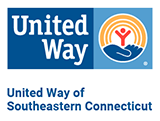Thanksgiving is next week, and I’m looking forward to running the Manchester Road Race and then coming home to stuffing, pie, and my aunt’s sweet potatoes with brown sugar and pecans. But for many families who struggle to put food on the table, Thanksgiving isn’t so simple. In fact, it can be downright stressful. Social service agencies and initiatives like our Mobile Food Pantry are there for people who can’t consistently afford healthy food, but some feel a stigma or sense of shame associated with seeking help. In a society that associates income with a person’s worthiness, and where discussing personal finances is often taboo, it’s hard to have the confidence to speak freely or know who else might be experiencing a similar situation. Many of us take pride in self-sufficiency, and falling on hard financial times can be a blow to our self- esteem: we feel exposed, vulnerable, singled out. But statistics show that food insecurity affects more of us than we think- a large portion of Americans haven’t been able to afford food at some point in the last year. In fact, for an economically developed country, the numbers are strikingly high. A 2013 Pew Research Center study (with a cool graph, check it out) found that nearly a quarter of Americans (24%) had trouble putting food on the table. For reference, that’s almost as many people as the three most populous states- California, Texas, and New York- combined. This problem of food insecurity is one that is particularly prevalent in our community and that United Way of Southeastern Connecticut has been committed to for years, so much so that our work has recently been recognized for by United Way Worldwide. In one of their blogs, they explain:
“…in southeastern Connecticut, where 19,000 people live below the poverty level, United Way of Southeastern Connecticut fights hunger by running the Gemma E. Moran United Way/Labor Food Center, the local foodbank for New London County. With the help of volunteers, the Food Center distributes food to partners who go on to provide meals to more than 20,000 people each month. United Way’s efforts to address hunger and health do not stop there—they also operate a mobile food pantry, a refrigerated truck full of fresh produce, dairy, grains and other perishable options. Each month, the mobile pantry visits areas in the region where access to grocery stores and supermarkets is limited; they distributed more than 285,000 meals last year alone.”
So this Thanksgiving, I know I’m going to be thankful for the food I have now, but also that there are organizations like United Way to support me, my family, my friends, or anyone else who might go through tough economic times in the future. In this time of thanks, I’m recommitting myself to supporting organizations that look out for the wellbeing of that 24% of Americans. I hope you’re able to share good food with family and friends this Thanksgiving as well.
Live United,
Caitlin
https://www.census.gov/data/tables/2016/demo/popest/state-total.html
https://www.unitedway.org/blog/addressing-hunger-and-health-through-food-access
